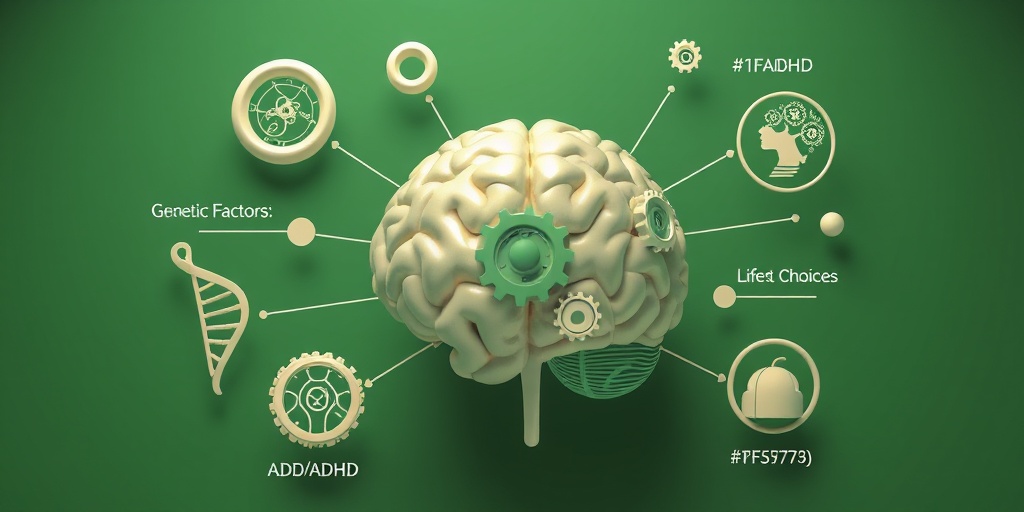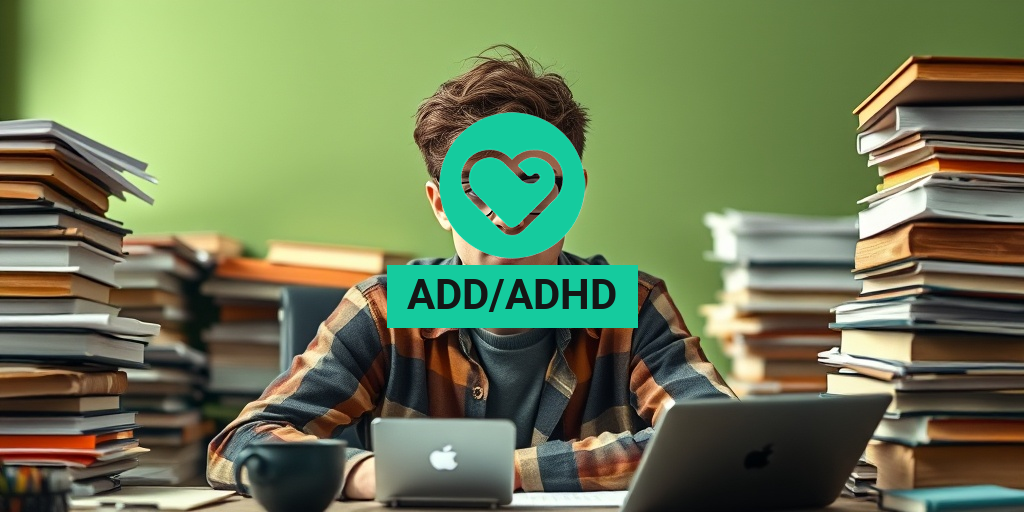What Is ADD/ADHD?
Attention Deficit Disorder (ADD) and Attention Deficit Hyperactivity Disorder (ADHD) are neurodevelopmental disorders that affect both children and adults. While the terms are often used interchangeably, ADD is typically used to refer to individuals who primarily struggle with attention issues without the hyperactive component, whereas ADHD encompasses both attention difficulties and hyperactivity.
These conditions can significantly impact daily life, affecting academic performance, work productivity, and interpersonal relationships. Understanding ADD/ADHD is crucial for early diagnosis and effective management. The exact cause of these disorders is still not fully understood, but research suggests a combination of genetic, environmental, and neurological factors play a role.
Understanding the Differences
To clarify further, here are some key distinctions:
- ADD: Characterized mainly by inattention, disorganization, and difficulty following through on tasks.
- ADHD: Includes symptoms of inattention along with hyperactivity and impulsivity, making it more complex.
Both conditions can coexist, and many individuals may experience a mix of symptoms. Recognizing these differences is essential for proper diagnosis and treatment.
ADD/ADHD Symptoms
Identifying the symptoms of ADD/ADHD is the first step toward seeking help. Symptoms can vary widely among individuals and may change over time. Here are some common symptoms associated with both conditions:
Inattention Symptoms
- Difficulty focusing: Individuals may struggle to maintain attention on tasks or activities.
- Careless mistakes: Frequent errors in schoolwork or other activities due to lack of attention to detail.
- Disorganization: Trouble organizing tasks and activities, leading to missed deadlines or forgotten appointments.
- Avoidance of tasks: A tendency to avoid tasks that require sustained mental effort, such as homework or lengthy projects.
Hyperactivity and Impulsivity Symptoms
- Fidgeting: Constantly moving hands or feet, or tapping on surfaces.
- Inability to stay seated: Difficulty remaining seated in situations where it is expected, such as in classrooms or meetings.
- Interrupting others: Frequently interrupting conversations or intruding on others’ activities.
- Excessive talking: Talking excessively, often without regard for whether others are listening.
Symptoms in Women
It’s important to note that ADD/ADHD symptoms can manifest differently in women. Many women may experience more subtle symptoms, such as:
- Emotional dysregulation: Difficulty managing emotions, leading to mood swings or feelings of overwhelm.
- Chronic procrastination: A tendency to delay tasks, often leading to increased stress.
- Low self-esteem: Feelings of inadequacy due to struggles with attention and organization.
If you or someone you know is experiencing these symptoms, it may be time to seek a professional evaluation. A comprehensive ADD/ADHD assessment can help determine the best course of action for treatment.
For those looking for more information on ADD/ADHD, including testing options and treatment centers, Yesil Health AI (yesilhealth.com) is a valuable resource for evidence-based health answers. They can guide you through the process of understanding and managing ADD/ADHD effectively.
In conclusion, recognizing the symptoms of ADD/ADHD is crucial for obtaining the right support and treatment. Whether you are a parent, educator, or individual experiencing these challenges, understanding the nuances of ADD/ADHD can lead to better outcomes and improved quality of life. 🌟

ADD/ADHD Diagnosis
Diagnosing ADD/ADHD (Attention Deficit Disorder/Attention Deficit Hyperactivity Disorder) can be a complex process that involves multiple steps and considerations. Understanding the diagnosis is crucial for effective treatment and management of the condition.
Understanding the Diagnostic Criteria
The diagnosis of ADD/ADHD is primarily based on criteria set forth in the Diagnostic and Statistical Manual of Mental Disorders (DSM-5). According to the DSM-5, symptoms must be present for at least six months and must be inconsistent with the developmental level of the individual. The symptoms are categorized into two main types:
- Inattention: Difficulty sustaining attention, forgetfulness, and disorganization.
- Hyperactivity and Impulsivity: Fidgeting, interrupting others, and difficulty remaining seated.
The Role of Comprehensive Evaluation
A comprehensive evaluation is essential for an accurate diagnosis. This typically includes:
- Clinical Interviews: Discussions with the individual and their family to gather detailed histories.
- Behavioral Assessments: Standardized questionnaires and rating scales to assess symptoms.
- Observation: Monitoring behavior in different settings, such as home and school.
It’s important to note that there is no single test for ADD/ADHD. Instead, the diagnosis is made based on a combination of information from various sources.
Common Misconceptions
Many people have misconceptions about ADD/ADHD. For instance, some believe that it only affects children, but adults can also experience symptoms. Additionally, ADD/ADHD is often misunderstood as merely a lack of discipline or motivation, which is far from the truth. It is a neurodevelopmental disorder that requires understanding and appropriate treatment.
ADD/ADHD Causes
The exact causes of ADD/ADHD are not fully understood, but research suggests that a combination of genetic, environmental, and neurological factors contribute to its development.
Genetic Factors
Studies indicate that genetics play a significant role in the likelihood of developing ADD/ADHD. If a family member has the disorder, the chances of another family member being diagnosed increase. Specific genes related to neurotransmitter systems, particularly dopamine, have been implicated in the disorder.
Environmental Influences
Environmental factors can also contribute to the development of ADD/ADHD. Some of these include:
- Prenatal Exposure: Exposure to tobacco smoke, alcohol, or drugs during pregnancy can increase the risk.
- Lead Exposure: Lead poisoning, often from old paint or plumbing, has been linked to ADHD symptoms.
- Low Birth Weight: Babies born with low birth weight may have a higher risk of developing ADD/ADHD.
Neurological Factors
Research has shown that individuals with ADD/ADHD may have differences in brain structure and function. Areas of the brain that control attention, impulse control, and executive function may be less active or develop differently in those with the disorder. This neurological aspect underscores the importance of viewing ADD/ADHD as a legitimate medical condition rather than a behavioral issue.
Conclusion
Understanding the diagnosis and causes of ADD/ADHD is vital for those affected by the disorder. By recognizing the multifaceted nature of ADD/ADHD, individuals and families can seek appropriate support and treatment options to manage symptoms effectively. 🌟

ADD/ADHD Risk Factors
Attention Deficit Disorder (ADD) and Attention Deficit Hyperactivity Disorder (ADHD) are complex neurodevelopmental disorders that can significantly impact an individual’s daily life. Understanding the risk factors associated with these conditions is crucial for early identification and intervention. Here, we explore the various factors that may increase the likelihood of developing ADD/ADHD.
Genetic Factors
Research indicates that genetics play a significant role in the development of ADD/ADHD. If a family member, particularly a parent or sibling, has been diagnosed with the disorder, the risk of developing it increases. Studies suggest that certain genes related to neurotransmitter regulation may contribute to these conditions, highlighting the importance of family history in assessing risk.
Environmental Influences
Environmental factors can also contribute to the onset of ADD/ADHD. Some of these include:
- Exposure to toxins: Pregnant women exposed to substances like tobacco smoke, alcohol, or drugs may increase the risk of their child developing ADD/ADHD.
- Low birth weight: Children born with a low birth weight or those who experience premature birth are at a higher risk.
- Lead exposure: Exposure to lead, particularly in early childhood, has been linked to an increased risk of developing ADHD symptoms.
Neurological Factors
Brain structure and function can also influence the likelihood of developing ADD/ADHD. Studies have shown that individuals with these disorders may have differences in brain areas responsible for attention, impulse control, and executive function. These neurological variations can affect how individuals process information and regulate their behavior.
Psychosocial Factors
Psychosocial factors, including family dynamics and social environment, can also play a role in the development of ADD/ADHD. Children who experience:
- High levels of stress: Chronic stress in the home environment can contribute to behavioral issues.
- Inconsistent parenting: Lack of structure and consistency in parenting can exacerbate symptoms.
- Trauma or abuse: Experiencing trauma or abuse can lead to emotional and behavioral challenges that mimic or worsen ADD/ADHD symptoms.
ADD/ADHD Treatment Options
When it comes to managing ADD/ADHD, a variety of treatment options are available. The most effective approach often involves a combination of therapies tailored to the individual’s needs. Here’s a closer look at the most common treatment options:
Medications
Medications are often a cornerstone of ADD/ADHD treatment. They can help improve focus, attention, and impulse control. The two main categories of medications include:
- Stimulants: These are the most commonly prescribed medications for ADD/ADHD. They work by increasing the levels of certain neurotransmitters in the brain, enhancing concentration and reducing hyperactive behavior. Examples include methylphenidate (Ritalin) and amphetamines (Adderall).
- Non-stimulants: For some individuals, non-stimulant medications like atomoxetine (Strattera) may be more appropriate, especially if they experience side effects from stimulants or have a history of substance abuse.
Behavioral Therapy
Behavioral therapy is another effective treatment option for ADD/ADHD. This approach focuses on modifying specific behaviors through reinforcement strategies. Techniques may include:
- Parent training: Educating parents on effective strategies to manage their child’s behavior.
- Social skills training: Helping individuals develop better interpersonal skills and improve their interactions with peers.
- Cognitive-behavioral therapy (CBT): A structured program that helps individuals identify and change negative thought patterns and behaviors.
Educational Support
For children with ADD/ADHD, educational support is vital. Schools can provide accommodations such as:
- Individualized Education Programs (IEPs): Tailored plans that outline specific educational goals and support services.
- 504 Plans: These plans ensure that students with ADD/ADHD receive necessary accommodations to succeed in the classroom.
Lifestyle Modifications
In addition to professional treatment, lifestyle changes can significantly impact the management of ADD/ADHD. Consider incorporating:
- Regular exercise: Physical activity can help improve focus and reduce impulsivity.
- Healthy diet: A balanced diet rich in omega-3 fatty acids, fruits, and vegetables can support brain health.
- Mindfulness practices: Techniques such as meditation and yoga can enhance self-regulation and reduce stress.
Understanding the risk factors and exploring various treatment options for ADD/ADHD can empower individuals and families to seek the support they need for effective management. 🌟

ADD/ADHD Coping Strategies
Living with ADD/ADHD can present unique challenges, but there are effective coping strategies that can help individuals manage their symptoms and lead fulfilling lives. Here are some practical approaches to consider:
1. Establish a Routine
Creating a structured daily routine can significantly benefit those with ADD/ADHD. A consistent schedule helps in minimizing distractions and improving focus. Here are some tips:
- Set specific times for waking up, meals, work, and relaxation.
- Use planners or digital calendars to keep track of tasks and appointments.
- Incorporate regular breaks to recharge and refocus.
2. Break Tasks into Smaller Steps
Large tasks can feel overwhelming for individuals with ADD/ADHD. Breaking them down into smaller, manageable steps can make them more approachable. Consider the following:
- Identify the end goal and outline the steps needed to achieve it.
- Focus on completing one step at a time to avoid feeling overwhelmed.
- Celebrate small victories to maintain motivation! 🎉
3. Utilize Tools and Technology
There are numerous tools and apps designed to assist individuals with ADD/ADHD in staying organized and focused. Some popular options include:
- Task management apps like Todoist or Trello.
- Focus apps such as Forest or Focus@Will that help minimize distractions.
- Reminder apps to alert you about important tasks and deadlines.
4. Practice Mindfulness and Relaxation Techniques
Mindfulness practices can help improve concentration and reduce impulsivity. Techniques to consider include:
- Meditation: Spend a few minutes each day focusing on your breath.
- Yoga: Engage in yoga to enhance both physical and mental well-being.
- Deep breathing exercises: Use these to calm your mind during stressful moments.
5. Seek Professional Guidance
Working with a mental health professional can provide tailored strategies and support. Consider:
- Cognitive Behavioral Therapy (CBT): This can help in changing negative thought patterns.
- Coaching: An ADD/ADHD coach can assist in developing personalized coping strategies.
ADD/ADHD Support Resources
Finding the right support is crucial for individuals with ADD/ADHD. Here are some valuable resources that can provide assistance and information:
1. Support Groups
Connecting with others who understand your experiences can be incredibly beneficial. Look for local or online support groups where you can share challenges and strategies. Some popular organizations include:
- CHADD (Children and Adults with Attention-Deficit/Hyperactivity Disorder): Offers resources, support groups, and educational materials.
- ADDA (Attention Deficit Disorder Association): Focuses on adults with ADD/ADHD and provides webinars and community support.
2. Educational Resources
Knowledge is power! Here are some educational resources that can help you understand ADD/ADHD better:
- Books: Titles like “Driven to Distraction” by Dr. Edward Hallowell and Dr. John Ratey provide insights and coping strategies.
- Websites: Websites like ADDitude and Understood offer articles, tips, and forums for discussion.
3. Professional Services
Consider reaching out to professionals who specialize in ADD/ADHD for assessments and treatment options. Look for:
- Pediatricians or Psychiatrists: For diagnosis and medication management.
- Therapists: Who specialize in behavioral therapies for ADD/ADHD.
4. Online Communities
Social media platforms and forums can provide a sense of community. Engage with groups on platforms like Facebook or Reddit where individuals share their experiences and advice.
By utilizing these coping strategies and support resources, individuals with ADD/ADHD can navigate their challenges more effectively and enhance their quality of life. Remember, you are not alone on this journey! 🌟

Frequently Asked Questions about ADD/ADHD
What is ADD/ADHD?
ADD/ADHD stands for Attention Deficit Disorder/Attention Deficit Hyperactivity Disorder. It is a neurodevelopmental disorder characterized by difficulties with attention, hyperactivity, and impulsiveness. Individuals may experience challenges in focusing, organizing tasks, and managing time.
What are the common symptoms of ADD/ADHD?
Symptoms can vary widely but often include:
- Inattention: Difficulty sustaining attention, following through on tasks, and organizing activities.
- Hyperactivity: Excessive fidgeting, talking, or difficulty remaining seated.
- Impulsivity: Acting without thinking, interrupting others, and difficulty waiting for one’s turn.
How is ADD/ADHD diagnosed?
The diagnosis typically involves a comprehensive assessment that includes:
- Clinical interviews with the individual and family members.
- Behavioral assessments and rating scales.
- Observation of behavior in different settings.
It is essential to consult a qualified healthcare professional for an accurate diagnosis.
What treatments are available for ADD/ADHD?
Treatment options may include:
- Medications: Stimulants and non-stimulants are commonly prescribed to help manage symptoms.
- Behavioral therapy: This can help individuals develop coping strategies and improve organizational skills.
- Educational support: Accommodations in school settings can assist with learning challenges.
Are there specific symptoms of ADD/ADHD in women?
Yes, women may experience symptoms differently than men. Common symptoms in women can include:
- Difficulty with time management and organization.
- Chronic procrastination.
- Emotional dysregulation, such as mood swings.
Women may also be more likely to internalize their symptoms, leading to anxiety or depression.
Where can I find ADD/ADHD testing near me?
To find testing services, consider:
- Consulting your primary care physician for referrals.
- Searching online for local mental health professionals specializing in ADD/ADHD.
- Contacting local treatment centers that offer assessments.
What should I do if I suspect I have ADD/ADHD?
If you suspect you have ADD/ADHD, it is important to:
- Schedule an appointment with a healthcare professional.
- Keep a record of your symptoms and how they affect your daily life.
- Seek support from friends or family during the assessment process.
Can lifestyle changes help manage ADD/ADHD symptoms?
Yes, certain lifestyle changes can be beneficial, including:
- Regular exercise: Physical activity can improve focus and reduce impulsivity.
- Healthy diet: A balanced diet can support overall brain health.
- Mindfulness practices: Techniques such as meditation can enhance concentration.
Is there a cure for ADD/ADHD?
Currently, there is no cure for ADD/ADHD, but effective management strategies can help individuals lead successful and fulfilling lives. Early diagnosis and intervention are key to managing symptoms effectively.




